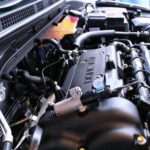Quick Navigation
Metal-on-metal sound when driving is not so uncommon, and there are many reasons why your car may make this sound.

Sometimes it is caused at a certain speed or faulty brakes, and it can also seem to be random to a layman.
When driving, the metal on metal sound can indicate something serious and can also be dangerous. Therefore, you should take your car to a mechanic, or you can deal with it if you know the cause.
Here are the scenarios, causes, and solutions for a metal on metal sound when driving explained:
Metal-On-Metal Sound When Stepping On Brakes
The first condition where you may be experiencing metal on metal sound while driving, which sounds like ‘clanking’ or ‘grinding,’ is when you step on breaks.
If you are hearing this sound specifically when you step on the breaks, here are some reasons you may want to explore:
Worn Out Brake Pads
Disc brake pads and drum brake shoes are often the cause of metal on metal sound while driving. It could be because the brake pads have worn through their lining and, as a result, are grinding into the rotor.
Rotors are large metal disks inside your wheels and integral parts of your braking system. Your brake rotors can be worn out if you are experiencing metal-on-metal sound while pushing the brake.
When brake pads are worn out, no friction is left on the backing plates. In this condition, when you step on the brakes, the contact is not light and regular like it usually is. Instead, the contact is high pressure.
If worn-out brake pads are causing the noises, the noise will come either from the front brakes or rear brakes. It is how you identify the cause.
If this is the case, the solution is to replace your brake pads and reground discs.
Brake Dust
Another cause of metal on metal sound while driving due to some brake fault is often brake dust. Brake dust is composed of carbon fibers that rub off the brake pad and tiny metal shavings from the rotor.
These can damage the wheels, leading to brake pads and discs erosion.
To get rid of brake dust, you can use a wheel and tire cleaner. All you have to do is spray the cleaner on dry wheels. Then let it rest for 1 to 2 minutes, and rinse the wheels with water.
Bent Brake Splash Shield
Another cause of metal on metal sound while driving while braking. A bent brake shield could be colliding with the brake rotor.

As you pull away, they come in contact and make the metal on metal ‘scraping’ noise. In this case, you need to take your car to the mechanic right away.
Metal-On-Metal Sound When Accelerating
If your car makes a metal on metal sound while using the accelerator, here are some of the causes why:
Broken Heat Shield
Heat shields are metal guards surrounding your car’s exhaust system, shielding other parts of your car from the excessive heat that the exhaust system gives off.
When a heat shield breaks, it exposes parts of your car to dust and moisture and even rust over time.
If the damage gets too much, your car may make a metal-on-metal rattling sound when driving while accelerating. It happens while accelerating as acceleration adds to the stress in the engine.
Heat shields are typically easy to repair, and the repair costs are not high either. You can have it spot welded at your local shop. However, if the damage is excessive, you may have to replace your broken heat shield with a new one.
Low Transmission Fluid
Transmission fluid comprises a thin layer in between moving parts that lubricates them. The thin layer prevents heating and corrosion between them due to friction.
When transmission fluid is low, it can cause the engine components to collide and rub against each other. It may cause metal-on-metal sounds when driving.
You should not ignore the sound due to low transmission fluid. As the metal components continue to grind against one another, gear slippage and wear and tear of gears.
The recommended fix is regularly changing your transmission fluid so that the situation never even comes as far as metal on metal sounds when driving.
When these sounds occur, you should check your fluid levels and add more if needed.
Metal-On-Metal Sound While Turning The Vehicle
Another occurrence of metal-on-metal sounds while driving is when you turn your steering wheel to make a turn.
Loose Wheel Bearing
Wheel bearings act as a buffer between the axle and the wheel to prevent friction between them. Loose wheel bearing may also be causing metal-on-metal sounds while driving.
It results in the rotor scraping against the caliper bracket when you turn.
Again, in this case, you should take your car to a mechanic as soon as possible.
Worn Out Wheel Bearings
Aside from loose wheel bearings, worn-out wheel bearings can also cause this noise. It is dangerous to drive with worn-out wheel bearings as it can result in the wheel coming to a halt while driving.
When driving, you should replace your wheel bearings right away if you notice this metal-on-metal grinding sound.
If you buy a second-hand car, you should look out for it. You wouldn’t want to buy a car and find out it still needs much work done, would you?
Metal-On-Metal Sound Random Occurrences
Loose Metal Parts
The metal on metal sound when driving may occur randomly. It can happen at random times, not precisely when braking or accelerating.
It could be due to loose metal parts, which could swing around and collide with one another.
If you hear such a noise, you should pull over. Once you do, check beneath your vehicle, under the hood, and beneath the engine and transmission.
This way, you can determine if some part is detached or has come loose. Often, it is the mounted spare tire provisions or the exhaust system.
If you cannot narrow down the cause, have a mechanic check out your vehicle.
Know that you can’t learn all there is about cars in a day. Just because you googled, it doesn’t mean you’re an expert.
These sounds should not be taken for granted. Remember, it’s better to be safe than sorry.
Final Thoughts
As explained, metal on metal sound when driving can potentially be dangerous. That is why it is a situation that needs to be addressed immediately.
Whether it is because of loose metal parts, low transmission fluids, faulty wheel bearings, immediate action is essential.
Once you have these things in mind, you can recognize the problem and deal with it. It can save you from purchasing many new car parts to replace the damaged ones.

James has been a car enthusiast since his childhood when he learned the differences between a ford and a chevy from his father. He loves to drive and restore old cars with a special drive for Italian marvels. Currently, he has a 1968 Alfa Romeo. He has studied aeronautics and civil aviation in his college and still gets smitten by Galant SS and Lancer GSR.
He is a New York-based product training director working with a giant automotive retailer. He loves to review and uncover the vehicles and their fascinating stories. He believes in keeping it legitimate with a keen passion for research on the latest technological upgrades in cars. While reading his articles or blogs, you can sense the extensive research and dedication backing the piece of text. He loves fried chicken, music, and spending quality time with his pet dog.






